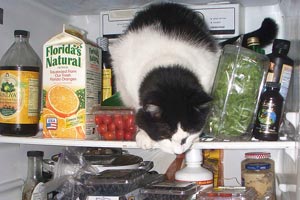
Flickr/<a href="http://www.flickr.com/photos/psyberartist/4003370402/in/photostream/" target="_blank">psyberartist</a>
This interesting question from Econundrums reader Myk recently caught my attention:
I have often wondered if it would be possible to unplug my fridge at night when I know for certain that no one will need to open it for eight hours. Would the unit keep in the cold if the doors remained closed?
The short answer is no, says LeeAnne Jackson, health science policy advisor at FDA’s Center for Food Safety and Applied Nutrition. “Refrigerators should be maintained at a constant temperature setting at 40 degrees Fahrenheit or below,” writes Jackson in an email. “Numerous foods in your refrigerator might have bacteria on them, and the cold temperature inhibits the bacteria from multiplying (or at least slows it down). If the food warms up, the bacteria will reach harmful levels faster.” For this reason, the USDA recommends that food left in an unplugged, unopened fridge for more than four hours be tossed. (Frozen items left in a full freezer stay good for two days; in a half full freezer it’s more like 24 hours.)
And even if you’re willing to risk spoiling your food (or you only keep in your fridge food that can withstand higher temperatures), the energy savings aren’t significant, since “if the refrigerator is unplugged more energy will be used to cool the refrigerator back down to 40 degrees Fahrenheit than if the refrigerator simply maintains the temperature at 40 degrees,” says Jackson.
Bruce Nordman, an energy efficiency researcher at the Lawrence Berkeley National Laboratory, basically agrees with Jackson. “You do use energy to go back to the original temperature, but should save some with the higher temperature,” he says. “However, the savings are strictly proportional to the amount of time at the higher average temperature, so you only save a lot if the temperature goes way up.” Which, of course, you wouldn’t want it to, given the bacteria problem.
Want to save energy in your fridge? Here are six top tips for maximizing the efficiency of your refrigerator, from the American Council for an Energy-Efficient Economy.
Got a burning eco-quandary? Submit it to econundrums@motherjones.com. Get all your green questions answered by visiting Econundrums on Facebook here.

















